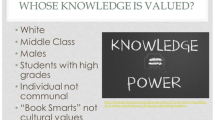Abstract
This paper critically examines some of the challenges that white educators who interrogate whiteness with white students encounter. Two specific dilemmas are addressed: Is one supporting white students’ learning when one tries to teach from the place “where the student is” and/or is one colluding with whiteness by appeasing white discomfort and protecting white fragility, one’s students as well as one’s own? Does one interpret what white students say as a query to be responded to or as a white distancing strategy that requires disruption? Each pedagogical challenge is described and debates around these issues are explored. Emphasis is given to the effects on students of color when white educators fail to respond appropriately. Implications for white progressive educators are drawn out. Two recommendations are discussed: Being willing to rock the boat and cultivating white double consciousness.
Similar content being viewed by others
Notes
Kate Manne. Down Girl: The Logic of Misogyny (New York: Oxford University Press, 2018): xxi. In her analysis of the concept of misogyny, Manne note the catch 22 in such an examination and cautions that examining the phenomenon one is liable to reproduce it.
Stephen Brookfield. “Uncovering and Challenging White Supremacy.” In George Yancy, ed., Education for Critical Consciousness (New York: Routledge, 2019): 11–27.
Ibid., 13.
Stephen Brookfield. “The Dynamics of Teaching about Race.” In his edited volume, Teaching Race: How to Help Students Unmask and Challenge Racism (New York: Wiley, 2018): 1–18.
Ibid., 8.
Robin DiAngelo. “White Fragility.” International Journal of Critical Pedagogy 3 (3): 54.
Ann Curry-Stevens. “New Forms of Transformative Education: Pedagogy for the Privileged.” Journal of Transformative Education 5 no. 1 (2007): 33–58.
Ibid., 45.
Zeus Leonardo. “The Colour of Supremacy: Beyond the Discourse of ‘White privilege’.” Educational Philosophy and Theory 36 no. 2 (2004): 137–152.
Ibid. 137.
Ann Curry-Stevens. “New Forms of Transformative Education,” 49.
Deanna Blackwell. “Sidelines and Separate Spaces: Making Education Anti-Racist for Students of Color.” Race, Ethnicity, and Education 13, no. 4 (2010): 473–494).
Ibid., 474.
George Yancy. Backlash: What Happens When We Talk Honestly About Racism in America (Lanhan, Maryland: Rowman and Littlefield, 2018): 75. Emphasis mine.
William A. Smith, Tara J. Yosso, Daniel G. Solórzano. “Challenging Racial Battle Fatigue on Historically White Campuses: A Critical Race Examination of Race-Related Stress.” In Christine Stanley, ed., Faculty of Color: Teaching in Predominately White Colleges and Universities (Bolton, MA: Anker Publishing, 2006): 299–327.
Alison Jones. “The Limits of Cross-Cultural Dialogue: Pedagogy, Desire, and Absolution in the Classroom.” Educational Theory 49, no. 3 (1999): 299–316.
Ibid., 302.
Deanna Blackwell. “Sidelines and Separate Spaces.”.
Zeus Leonardo & Ronald Porter. “Pedagogy of Fear: Toward a Fanonian Theory of ‘Safety’ in Race Dialogue.” Race, Ethnicity & Education 13, no. 2 (2010): 140.
Deanna Blackwell. “Sidelines and Separate Spaces.”.
Ibid., 485.
Alison Jones. “The Limits of Cross-Cultural Dialogue.”.
Ibid., 308.
Robin DiAngelo and Ozlem Sensoy. “Getting Slammed: White Depictions of Race Discussions as Arenas of Violence.” Race, Ethnicity, and Education 17, no. 1 (2014): 103–128.
Ibid. 105.
Kathy Hytten and John Warren. “Engaging Whiteness: How Racial Power Gets Reified in Education,” Qualitative Studies in Education 16, no. 1 (2003): 65–89.
Ibid., 79.
Derald Wing Sue. Microaggressions in Everyday Life: Race, Gender, and Sexual Orientation (New York: Wiley and Sons, 2010): xvi.
George Yancy. Black Bodies, White Gazes: The Continuing Significance of Race (Lanham, Maryland: Rowman and Littlefield, 2008).
Karen Tao, Jesse Owen and Joanan Drinane. “Was that Racist? An Experimental Study of Microaggression Ambiguity and Emotional Reactions for Racial–Ethnic Minority and White Individuals.” Race and Social Problems 9. No.4 (2017): 262–271.
Saba Fatima. “On the Edge of Knowing: Microaggressions and Epistemic Uncertainty as a Woman of Color.” In Kirsti Cole and Holly Hassel, eds., Surviving Sexism in Academia: Feminist Strategies for Leadership. (New York: Routledge 2017): 147–154.
Ibid. 148.
Christina Friedlaender. “On Microaggressions: Cumulative Harm and Individual Responsibility.” Hypatia 33, no. 1 (2018): 5–21.
Sara Ahmed. “Declarations of Whiteness: The Non-Performativity of Anti-Racism.” borderlands e-journal 3, no. 2 (2004) http://www.borderlands.net.au/vol3no2_2004/ahmed_declarations.htm.
Ibid.
Ibid.
Charles Mills. “White Ignorance.” In Shannon Sullivan and Nancy Tuana, eds., Race and Epistemologies of Ignorance (Albany: State University of New York Press, 2007): 13–38.
Elizabeth Spelman. “Managing Ignorance.” In. Race and Epistemologies of Ignorance: 119–131.
Marilyn Frye. The Politics of Reality: Essays in Feminist Theory (Trumansburg, New York: The Crossing Press, 1983).
Alexis Shotwell. Knowing Otherwise: Race, Gender, and Implicit Understanding (University Park, PA: Pennsylvania State University, 2011).
William A. Smith, Tara J. Yosso, Daniel G. Solórzano. “Challenging Racial Battle Fatigue.”.
Alison Jones. “The Limits of Cross-Cultural Dialogue.”; Deanna Blackwell. “Sidelines and Separate Spaces.”.
Sara Ahmed. Living a Feminist Life (Durham, NC: Duke University Press, 2017): 257–258.
Ibid., 21.
Ibid.
Sara Ahmed. The Promise of Happiness (Durham, NC: Duke University Press, 2010).
Ibid., 62.
Ibid., 64.
Ibid., 42.
Sara Ahmed. Living a Feminist Life, 65.
Sara Ahmed, The Promise of Happiness, 20.
Ibid.
Sara Ahmed, “Rocking the Boat: Women of Colour as Diversity Workers. In Jason Arday and Heidi Safia Mirza, eds., Dismantling Race in Higher Education: Racism, Whiteness and Decolonsing the Academy (New York: Palgrave, 2018): 331–348.
Linda Martin Alcoff, The Future of Whiteness. (Malden MA: Polity Press, 2015).
Ibid. 140. Emphasis mine.
See Zeus Leonardo, “Whiteness Studies and Educational Supremacy: The Unbearable Whiteness of Schooling,” in his Race Frameworks: A Multidimensional Theory of Racism and Education (New York: Teachers College Press, 2013): 96.
bell hooks, “Representing Whiteness in the Black Imagination.” In her Black Looks: Race and Representation (London, Turnaround, 1992).
Ibid., 169.
DiDi Delgado, “Whites Only: SURJ And The Caucasian Invasion Of Racial Justice Spaces” https://www.huffpost.com/entry/whites-only-surj-and-the-caucasian-invasion-of-racial_b_58dd5cf7e4b04ba4a5e25209.
Author information
Authors and Affiliations
Corresponding author
Additional information
Publisher's Note
Springer Nature remains neutral with regard to jurisdictional claims in published maps and institutional affiliations.
Rights and permissions
About this article
Cite this article
Applebaum, B. Ongoing Challenges for White Educators Teaching White Students About Whiteness. Stud Philos Educ 40, 429–441 (2021). https://doi.org/10.1007/s11217-021-09771-y
Accepted:
Published:
Issue Date:
DOI: https://doi.org/10.1007/s11217-021-09771-y




